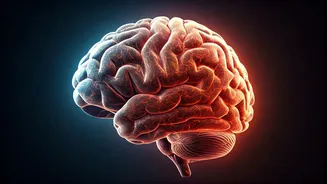Dopamine's Reward Circuit
The brain's reward circuit plays a crucial role in our lives, primarily managed by a neurotransmitter called dopamine. Dopamine is not simply a 'pleasure
chemical'; instead, it's involved in motivation, reward, and reinforcement. When we experience something rewarding, like a delicious meal or a satisfying achievement, dopamine is released, reinforcing the behavior. This encourages us to repeat those actions. This system is essential for survival, motivating us to seek food, water, and shelter. However, modern life has introduced various stimuli, some that can overwhelm this circuit, and others, that can trick the system. Understanding this fundamental system is key to managing our responses and behaviors effectively.
Modern Lifestyle: Overload
Modern lifestyles are characterized by constant exposure to novel stimuli, contributing to frequent dopamine release. Consider the effects of social media. The likes, comments, and notifications create a cycle of anticipation and reward, triggering dopamine surges in the brain. Similarly, the easily accessible nature of entertainment like streaming services and video games can lead to excessive stimulation. These modern experiences trigger dopamine spikes, which can make us feel good in the moment. However, repeated exposure to these activities can desensitize the brain, leading to a need for increasingly stronger stimuli to achieve the same level of satisfaction. This can have significant effects on mood, motivation, and overall well-being. This overload can change how we value other activities.
From Substances to Screens
The principles of dopamine overload extend beyond the more obvious cases of substance abuse. While drugs like cocaine and heroin directly manipulate dopamine pathways, various modern activities and technologies can produce similar effects. The constant access to information, social interaction, and entertainment through smartphones and the internet can create a virtual environment that floods the brain with dopamine. Online shopping, where the anticipation of a purchase and the instant gratification of a new item triggers a reward response, is another example. These behaviors, while seemingly harmless, can be just as problematic as substance use when they become compulsive or interfere with daily life. People become addicted to the rush they receive.
Reclaiming Balance: Strategies
Reclaiming balance involves consciously managing dopamine levels and making intentional lifestyle changes. One strategy is to reduce exposure to dopamine-inducing stimuli. This could involve limiting social media use, setting time limits for entertainment, or creating periods of digital detox. Prioritizing activities that provide a more natural and sustainable reward, like spending time in nature, exercising, or engaging in creative pursuits, is also important. Mindfulness practices can also help to increase awareness of the brain's reward system, enabling a more mindful approach to these triggers. Restricting yourself from the use of dopamine inducing substances can provide the brain with a break that is needed for long term wellbeing.
Progression Over Time
Regaining control over dopamine regulation is a journey that requires time, patience, and commitment. The brain is remarkably adaptable, and with consistent effort, it can recalibrate its reward pathways. The journey involves setting realistic goals, celebrating small victories, and being kind to oneself during setbacks. It's essential to understand that change takes time, and there will be times when the old habits resurface. The key is to recognize these patterns and use them as opportunities to learn and refine strategies. Consistency and a focus on long-term well-being will ultimately lead to a more balanced and fulfilling life. Prioritizing well-being over short-term pleasures is the key.












